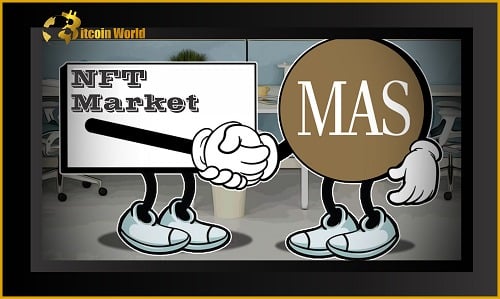The world of Non-Fungible Tokens (NFTs) is buzzing, and Singapore, a global financial powerhouse, is taking a unique approach. Instead of rushing to regulate this burgeoning digital asset class, the Monetary Authority of Singapore (MAS), the country’s central bank, is choosing to observe and understand. In a market that exploded by a staggering 26,000% in 2021, reaching a whopping $25 billion in sales, this hands-off approach raises eyebrows and sparks conversations. Let’s dive into why Singapore is taking a ‘wait-and-see’ stance on NFT regulation and what it could mean for the future of NFTs.
Why Are Regulators Worldwide Watching the NFT Space?
NFTs have captured the imagination of artists, celebrities, and major brands alike. From Nike and Coca-Cola venturing into digital collectibles to Snoop Dogg and Lionel Messi launching their own NFT projects, the mainstream adoption is undeniable. This rapid growth hasn’t gone unnoticed by financial regulators globally. They are keen to understand the implications, risks, and opportunities presented by this new technology. Many are considering how to protect investors and ensure market integrity in this relatively uncharted territory.
However, Singapore is charting a different course, at least for now. Tharman Shanmugaratnam, Senior Minister in Charge of MAS, clarified that Singapore won’t be rushing to impose regulations on NFTs. Instead, the country is adopting a “tech-neutral” position. But what does this mean in practice?
According to Fintech News Singapore, MAS believes it “does not and cannot potentially oversee all things or products that people choose to invest their money in.” This statement highlights a key principle in Singapore’s regulatory philosophy: personal responsibility and a focus on broader financial stability rather than micromanaging every investment trend.
Why is Regulating NFTs Such a Complex Challenge?
The MAS’s stance isn’t about ignoring NFTs; it’s about recognizing the complexities involved in regulating such a novel and evolving market. Here’s a breakdown of the challenges:
- Defining NFTs: What exactly *is* an NFT from a regulatory perspective? Are they securities, commodities, or something entirely new? The unique nature of NFTs, representing digital ownership of diverse assets, makes categorization difficult.
- Technological Neutrality: Singapore aims to be tech-neutral, meaning regulations should focus on the activity and risks, not the technology itself. Applying existing financial regulations to NFTs, which operate on blockchain technology, requires careful consideration.
- Global Nature: The NFT market is global and decentralized. Regulating it within a single jurisdiction like Singapore is challenging when transactions and ownership can span across borders.
- Speculative Nature and Investor Protection: The MAS acknowledges the speculative demand driving NFT prices. They recognize the risk of significant losses for investors if the hype fades. However, regulating to curb speculation without stifling innovation is a delicate balance.
- Legal Ambiguities: The legal rights and protections for NFT owners are still being defined. Existing laws may not adequately cover the unique aspects of NFT ownership and transactions, making regulation premature.
Tharman Shanmugaratnam emphasized that regulating NFTs would be a “significant undertaking,” requiring deep consideration of the legal framework and investor protection mechanisms. He pointed out that the perceived uniqueness of NFTs, coupled with speculative fervor, has inflated prices, creating potential risks for investors.
Key Takeaway: Singapore’s approach is not about ignoring the NFT market but about taking a measured and informed approach. They are prioritizing understanding the long-term implications and risks before implementing specific regulations.
What Does This Mean for the NFT Market?
Singapore’s decision to hold off on immediate NFT regulations could have several implications:
- Attracting Innovation: A less regulated environment might attract NFT projects, platforms, and businesses to Singapore, fostering innovation and growth within the sector.
- Market-Driven Evolution: Allowing the market to develop organically can lead to more effective and tailored regulations in the future, based on real-world observations and challenges.
- Increased Risk for Investors: Without regulatory oversight, investors bear a greater responsibility to conduct their own due diligence and understand the risks associated with NFT investments.
- Focus on Education: Singapore’s approach might emphasize investor education and awareness campaigns to help individuals make informed decisions in the NFT space.
Singapore and Crypto: A Hub for Digital Assets
Singapore’s stance on NFTs is consistent with its broader approach to the cryptocurrency and blockchain space. The nation aims to be a hub for digital asset innovation while maintaining financial stability and protecting consumers. While not rushing to regulate NFTs specifically, Singapore has established frameworks for cryptocurrency exchanges and other digital payment token services.
In Conclusion: Observation is Key
Singapore’s decision to observe the NFT market before regulating is a calculated move. It reflects a belief in technological neutrality, a recognition of the complexities of NFT regulation, and a commitment to fostering innovation. While some might see this as a risky approach, it could also be a strategic one, allowing Singapore to learn from the market’s evolution and develop more effective and balanced regulations in the long run. For now, the NFT world will be watching Singapore closely to see how this tech-neutral approach unfolds and whether it sets a precedent for other jurisdictions.
Related Post – Ferrari joins the NFT universe through a collaboration with a Swiss…
Disclaimer: The information provided is not trading advice, Bitcoinworld.co.in holds no liability for any investments made based on the information provided on this page. We strongly recommend independent research and/or consultation with a qualified professional before making any investment decisions.


